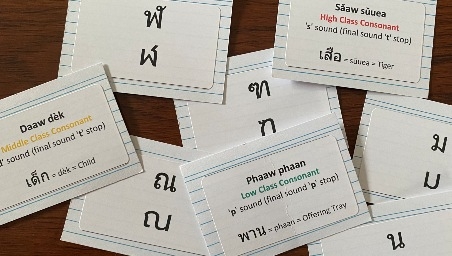 If you've just started learning Thai, or would like to get started but aren't sure where to begin, use the steps below as a roadmap for
your journey into the Thai language. Learning a new language — especially one that looks and sounds quite different from your native
tongue — can feel overwhelming at times, but with the right approach and consistent effort, you'll make steady progress.
If you've just started learning Thai, or would like to get started but aren't sure where to begin, use the steps below as a roadmap for
your journey into the Thai language. Learning a new language — especially one that looks and sounds quite different from your native
tongue — can feel overwhelming at times, but with the right approach and consistent effort, you'll make steady progress.
Why Use Flashcards Regularly?
One of the most effective tools for language learning is the regular use of flashcards. Flashcards strengthen memory by combining active recall (prompting yourself to remember the meaning) and spaced repetition (revisiting words at smart intervals). With frequent review, your brain learns to recognize and retrieve Thai words more quickly and naturally.
- Builds long-term memory: Repeated exposure moves words from short-term to long-term memory.
- Targets weak spots: You can focus on cards you often miss, making study time efficient.
- Boosts confidence: Familiar words appear more frequently in reading and listening, speeding up comprehension.
Daily Habits That Work
We recommend practicing daily, even if only for a few minutes at a time. Consistency is more effective than long but infrequent sessions. Be patient with yourself, keep up the daily routine, and let momentum build.
Aim to review 50 flashcards per day. Expect to see each card multiple times before it truly sticks — usually at least 5 to 10 reviews per word, depending on your memory and the word's difficulty.
By making flashcards a regular part of your study habit, you'll find your vocabulary growing naturally, your reading and listening comprehension improving, and your confidence in using Thai steadily increasing.
Recommendations Before Proceeding
Before proceeding we recommend reviewing this short introduction to transliteration text, which is very helpful when first learning the Thai language.
Please also check out our Overview page for full details on all the language learning tools available at funtolearnthai.com
 Start learning the Thai consonants and build-up your knowledge of some basic vocabulary.
Start learning the Thai consonants and build-up your knowledge of some basic vocabulary. We recommend getting a teacher and/or joining a class. There are many great Thai teachers and online classes available that
will really help accelerate your learning and answer the many questions you're likely to have as your studying progresses.
We recommend getting a teacher and/or joining a class. There are many great Thai teachers and online classes available that
will really help accelerate your learning and answer the many questions you're likely to have as your studying progresses. Regularly practice the different
Regularly practice the different